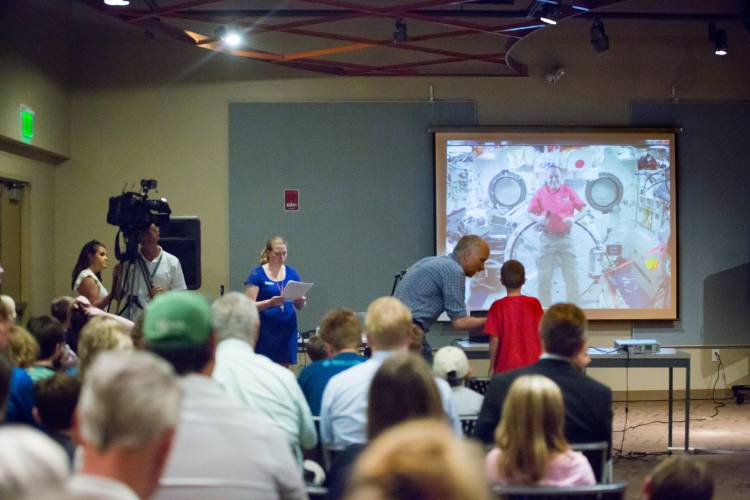Judging from the audience reaction, if you ever get a chance to ask a question of an astronaut floating around on the International Space Station, ask about dental hygiene.
“How do you keep from making a mess when you brush your teeth?” asked Luke Morrow, one of 21 children who got a chance to question astronaut Ricky Arnold in a live video link Thursday at the McAuliffe-Shepard Discovery Center. The nearly 100 people who packed the meeting room laughed, and laughed more at Arnold’s answer:
“It’s interesting, because water behaves strangely up here. It likes to stick together … so you try to get rid of toothpaste, it creeps up your face and up your nose.”
Thursday’s 20-minute connection with the space station was a treat for the Discovery Center, which last hosted a live downlink from space in 1998.
Questions were submitted from children attending the Discovery Center’s various summer programs. Twenty-one were approved in advance by NASA and asked by the children ranging in ages from 6 to 15, in a show broadcast live on NASA TV, the space administration’s cable channel, in a connection made by Concord TV, the city’s cable access channel.
You can see the whole session here. Here are some of the questions from various children during Thursday’s session, and edited replies from Arnold:
How did you train to become an astronaut? (Cailin Tarr)
“I went to school, was hired by NASA … did two years of additional training, principals of avitation, how they work how spacecrafts work, a lot of basic science classes – and also Russian language.”
What do you do all day? (Nick Morrow)
“When you arrive at school … you’ll be handed a schedule, telling you what your day is going to be like. That’s what it’s like on the space station. We get a schedule – from 7:30 in the morning to 7:30 at night – every day. We repair things, we install hardware, and the bulk of the time we spend doing science experiments.”
Is time different on the space station? (Sarah Pollard)
“We are on Greenwich Mean Time, I think we’re about five hours ahead of you. … We do that because have control centers all around the world, in Japan, Russian, Germany, the United States, and tried to find a nice middle-of-the-road time zone.”
What is it like being weightless in space and is it hard to move around? (Theodore Coulter)
Arnold answered this one by floating out of view of the camera, then returning. “It’s easy to move up here. It’s a lot of fun. one of the downsides is that everything you own can move just as easily. … Up here, you put something down, you might not find it again for weeks or even months later if it floats away.”
What is your favorite space food? (Tristan Moffroid)
“After 140-some days, I’m running low on favorite space food right now. If I had to make a choice, we have a chicken and peanut sauce that’s pretty good, especially if I put more peanut butter and hot sauce in it.”
What is the coolest or weirdest thing you have seen while on the space station?(Ethan Lajewski)
“One of the cool and weird things is just the way water behaves. It sticks together, the bubbles form perfect spheres. Just watching the way water behaves is a really, really cool thing. … The other thing is watching the Earth. The other day I was looking out the window and saw a Category 4 hurricane, the Big Island of Hawaii, and a volcano erupting, all in one window pane.”
How long does it take to get used to zero gravity? (Amelia Moffroid)
“The first time I flew in space it probably took three or four days before I was feeligreally comfortable being here. You can feel a little sick when you first arrive here. This time, it was like my brain remembered. We launched in Soyuz and I instantly felt fine … your brain can figure it out – I’ve been here before, I can adjust very quickly”
Will people make it to Mars? Mary Gilbert
“Yes.”
Was it scary traveling into space? (Evelyn Smith)
“Kind of, getting ready for your first rocket launch is a little intimidating, but one of the nice things is you get to meet all the people around the world who make space flight possible. When you realize how committed they are to doing their job right every since time … you learn to trust the team that is reponsible for getting you here, taking care of you while you are home, and getting you home safely. That makes it a lot less scary.”


 Return to the Concord Monitor
Return to the Concord Monitor